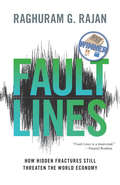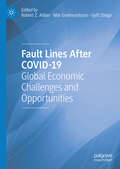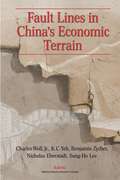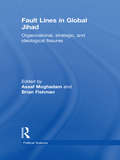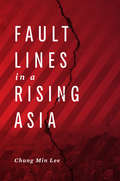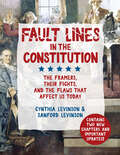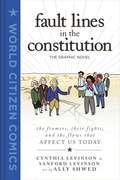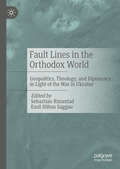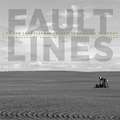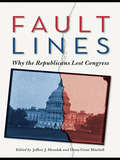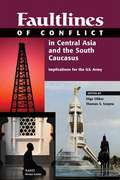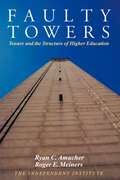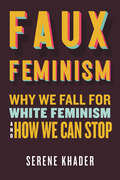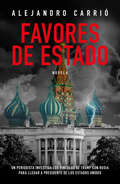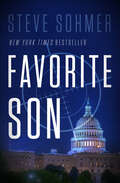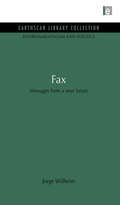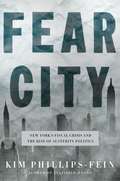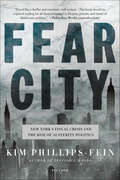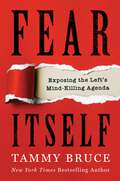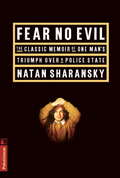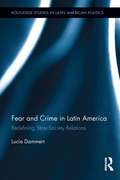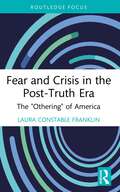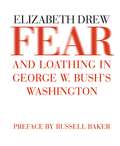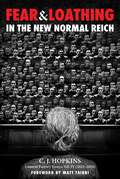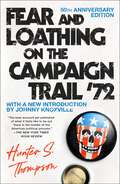- Table View
- List View
Fault Lines
by Raghuram G. RajanRaghuram Rajan was one of the few economists who warned of the global financial crisis before it hit. Now, as the world struggles to recover, it's tempting to blame what happened on just a few greedy bankers who took irrational risks and left the rest of us to foot the bill. In Fault Lines, Rajan argues that serious flaws in the economy are also to blame, and warns that a potentially more devastating crisis awaits us if they aren't fixed.Rajan shows how the individual choices that collectively brought about the economic meltdown--made by bankers, government officials, and ordinary homeowners--were rational responses to a flawed global financial order in which the incentives to take on risk are incredibly out of step with the dangers those risks pose. He traces the deepening fault lines in a world overly dependent on the indebted American consumer to power global economic growth and stave off global downturns. He exposes a system where America's growing inequality and thin social safety net create tremendous political pressure to encourage easy credit and keep job creation robust, no matter what the consequences to the economy's long-term health; and where the U.S. financial sector, with its skewed incentives, is the critical but unstable link between an overstimulated America and an underconsuming world.In Fault Lines, Rajan demonstrates how unequal access to education and health care in the United States puts us all in deeper financial peril, even as the economic choices of countries like Germany, Japan, and China place an undue burden on America to get its policies right. He outlines the hard choices we need to make to ensure a more stable world economy and restore lasting prosperity.
Fault Lines After COVID-19: Global Economic Challenges and Opportunities
by Robert Z. Aliber Gylfi Zoega Már GudmundssonThis book explores the central economic and political issues defining the modern world. With contributions from a number of world renowned economists, a range of topical debates are discussed in an accessible and practical manner. The topics discussed include the current economic and political backdrop, global economic shifts, challenges within central banking and financial integration, the international monetary and financial system, and geopolitical tensions. Particular attention is given to the transition to a low carbon economy, the perils of public debt, the post-COVID-19 recovery, and the conflict in Ukraine.This book aims to envisage the economic challenges and opportunities that will be faced in the years to come. It will be relevant to students, researchers, and policymakers interested in economic policy and the political economy.Chapter-No.17 is available open access under a Creative Commons Attribution 4.0 International License via link.springer.com.
Fault Lines in China's Economic Terrain
by K. C. Yeh Charles Jr. Wolf Nicholas Eberstadt Benjamin Zycher Sungho LeeThe authors consider how and by how much China's stellar economic performance might be impaired by eight potential adversities that China may face in the next decade: unemployment, poverty, and social unrest; corruption; HIV/AIDS and epidemic diseases; water resource problems and pollution; energy consumption and prices; the fragile financial system and state-owned enterprises; curtailed foreign direct investment; and serious military conflicts.
Fault Lines in Global Jihad: Organizational, Strategic, and Ideological Fissures (Political Violence)
by Assaf Moghadam Brian FishmanThis book deals with the causes, nature, and impact of the divisions within the jihadi movement, and the splits between jihadis and other Islamic groups. Fault Lines in Global Jihad offers a systematic and comprehensive examination of the broad range of divisions that contribute to the weakening of the jihadi movement. It separates these divisions into two broad categories, namely fissures dividing jihadis themselves, and divisions separating jihadis from other Muslim and Islamist groups. The first part of the book covers intra-jihadi divisions, highlighting tensions and divisions over strategic, tactical, and organizational issues. The second part of the book addresses several important case studies of jihadi altercations with other Muslim and Islamist groups of non-jihadi persuasion, such as the Muslim Brotherhood, Hamas, and the Shii community. More than simply an enumeration of problems and cracks within al-Qa’ida and its cohorts, this book addresses critical policy issues of relevance to the broader struggle against the global jihadi movement. The editors conclude that these divisions have and continue to weaken al-Qa’ida, but neither in an automatic nor in an exclusive fashion—for these divisions render the global jihadi movement simultaneously vulnerable and more resilient. This book will be of much interest to students of jihadism, terrorism and political violence, Islamism, security studies and IR in general.
Fault Lines in a Rising Asia
by Chung Min LeeAsia has already risen by most hard-power measures. But without an understanding of the downsides of Asia's rise, the conventional narrative is incomplete, misleading, and inaccurate. Chung Min Lee explores the fundamental dichotomy that defines contemporary Asia. While the region has been an unparalleled economic success, it is also home to some of the world's most dangerous, diverse, and divisive challenges. Contrary to prevailing wisdom, he says, Asia's rise doesn't mean the demise of the West.Asia's rise over the past four decades is one of the most significant geopolitical and geoeconomic developments in world affairs as evinced by China's, and more recently, India's, accelerated economic growth. Yet the conventional narrative of Asia's rise is incomplete, if not misleading, given the fundamental dichotomy that defines contemporary Asia: a region with unparalleled economic success but also home to the world's most dangerous, diverse, and divisive security, military, and political challenges. How the strategically consequential Asian states manage to ameliorate or even overcome traditional geopolitical tinderboxes across the Taiwan Strait, the Korean Peninsula, and the Indian subcontinent and new zones of strategic competition such as the South China Sea is to going to have a profound impact on the shaping of regional order well into the 21st century.
Fault Lines in the Constitution: The Framers, Their Fights, and the Flaws that Affect Us Today
by Sanford Levinson Cynthia LevinsonA noted children's nonfiction author and one of the nation's foremost constitutional scholars team up to create an essential book on the United States Constitution for everyone grappling with today's most urgent political issues.Many of the political issues we struggle with today have their roots in one place—the U.S. Constitution. Fault Lines in the Constitution takes readers back to the creation of this historic document and reveals how many of the problems that trouble us today—such as voting rights, the Electoral College, gerrymandering—were first introduced. Cynthia and Sanford Levinson explain the unexpected ramifications of decisions make in 1787 and explore possible solutions found in the constitutions of states and other countries.Each chapter begins with a story―all but one of them true―that connects directly back to a section of the document that forms the basis of our society and government. Informative sidebars and graphics run throughout along with a timeline and bibliography.
Fault Lines in the Constitution: The Graphic Novel (World Citizen Comics)
by Sanford Levinson Cynthia LevinsonThe latest volume in our World Citizen Comics graphic novel series, Fault Lines in the Constitution teaches readers how this founding document continues to shape modern American society.In 1787, after 116 days of heated debates and bitter arguments, the United States Constitution was created. This imperfect document set forth America’s guiding principles, but it would also introduce some of today's most contentious political issues—from gerrymandering, to the Electoral College, to presidential impeachment.With colorful art, compelling discourse, and true stories from America's past and present, Fault Lines in the Constitution: The Graphic Novel sheds light on how today's political struggles have their origins in the decisions of our Founding Fathers. Children’s book author Cynthia Levinson, constitutional law scholar Sanford Levinson, and artist Ally Shwed deftly illustrate how contemporary problems arose from this founding document—and then they offer possible solutions.
Fault Lines in the Orthodox World: Geopolitics, Theology, and Diplomacy in Light of the War in Ukraine
by Sebastian Rimestad Emil Hilton SaggauThroughout the past years, the Orthodox world has seen numerous political and theological confrontations. New borders have been shaped by churches and states. This only increased in light of the Russian-backed conflict in Ukraine from 2014 and onwards, which has led to new theological lines of thinking, geopolitical confrontations, and an acute need for diplomatic handling of crisis. At the centre is the Russian Orthodox Church’s global role and its effects in Ukraine. The confrontations are born out of a complex entanglement of church politics, theological differences, legal tensions, national allegiances, and the very concrete political and military clashes between nation states. In light of the war in Ukraine, Global Orthodoxy has seen new fault lines in the making. This volume gathers chapters that shed light on these entanglements and their political, theological, and geopolitical consequences. The book is not limited to the Russian-Ukrainian conflict, but also includes papers focusing on other nations, churches, and aspects (theological, theoretical, geopolitical, empirical etc.).
Fault Lines: Life and Landscape in Saskatchewan's Oil Economy
by Emily Eaton Valerie ZinkOil is not new to Saskatchewan. Many of the wells found on farmland across the province date back to the 1950s when the industry began to spread. But there is little doubt that the recent boom (2006–2014) and subsequent downturn in unconventional oil production has reshaped rural lives and landscapes. While many small towns were suffering from depopulation and decline, others reoriented themselves around a booming oil industry. In place of the abandoned houses and shuttered shops found in many small towns in Saskatchewan, housing developments sprang up with new trucks and boats parked in driveways. Yet people in oil-producing areas also lived amid flare stacks that made them ill, had trouble finding housing due to vacancy rates that were among the lowest in the country, suffered through family breakdown because of long working hours and time spent away from home, and endured spills and leaks that contaminated their land. In the summer of 2014, at the height of the boom, geographer Emily Eaton and photographer Valerie Zink travelled to oil towns across the province, from the sea-can motel built from shipping containers on the outskirts of Estevan to seismic testing sites on Thunderchild First Nation’s Sundance grounds.
Fault Lines: Why the Republicans Lost Congress (Controversies in Electoral Democracy and Representation)
by Jeffery J. Mondak Dona-Gene MitchellIn some years elections bring about enduring changes to the American political scene. In 2006, a pivotal election year, the Republicans suffered a resounding defeat, losing the House and Senate for the first time since the 1994 "Republican Revolution." But what caused this pivotal shift? Fault Lines provides both a wealth of insight regarding what happened in the 2006 congressional elections and a framework to aid in understanding the possible significance of the 2006 outcome for subsequent developments in American politics. Contributors to Fault Lines, who all draw on the data from the 2006 Congressional Elections Study, include many of the nation’s most prominent and accomplished observers of Congress and congressional elections. This book promises to be an influential contribution to our understanding of Congress, congressional elections, the Bush administration, media and politics, political communication, and partisan polarization.
Faultlines of Conflict in Central Asia and the South Caucasus
by Olga Oliker Peter A. Wilson Thomas S. Szayna Scott PaceIn the region of Central Asia and South Caucasus, what is the potential for armed conflict, and how might such outbreaks escalate to a level that could involve U.S. forces? The authors evaluate the key political, economic, and societal faultlines underlying the likelihood of conflict in the region, assessing their implications for regional stability and for U.S. interests and potential involvement over the next 10 to 15 years.
Faulty Towers: Tenure and the Structure of Higher Education
by Ryan C. Amacher Roger E. MeinersIn Faulty Towers: Tenure and the Structure of Higher Education, Ryan C. Amacher and Roger E. Meiners examine the internal and external reforms necessary to bring competitive forces to American universities and thereby improve them.As debate accelerates over the declining standards in higher education, academic tenure is viewed with suspicion by many, who see it merely as job protection for incompetent teachers. Even many professors believe tenure is a guarantee of lifelong entitlement, whereby only the commission of a crime can lead to dismissal. Faulty Towers sets the record straight by elucidating the history, legal status, and common misunderstandings regarding tenure. Tenured professors who have become incompetent are rarely dismissed, and superior teaching is rarely rewarded, although there is little to prevent universities from doing so. Tough administrators are also hard to find—in part because university trustees seldom hold them accountable. Faulty Towers explains how restructuring university incentives to be more in line with those of market-based enterprises would produce greater accountability, stronger boards of trustees, more effective administrators, and a tenure system that protects academic freedom but not substandard education.
Faux Feminism: Why We Fall for White Feminism and How We Can Stop
by Serene KhaderFor readers of Hood Feminism and Against White FeminismAn incisive examination of why the pillars of feminism have eroded—and how all women, not just the #girlbosses, can rebuild themAfter over 175 years, the feminist movement, now in its fourth wave, is at risk of collapsing on its eroding foundation. In Faux Feminism, political philosopher Serene Khader advocates for another feminism—one that doesn&’t overwhelmingly serve white, affluent #girlbosses. With empathy, passion, and wit, Khader invites the reader to join her as she excavates the movement&’s history and draws a blueprint for a more inclusive and resilient future.A feminist myth buster, Khader begins by deconstructing &“faux feminisms.&” Thought to be the pillars of good feminism, they may appeal to many but, in truth, leave most women behind. Khader identifies these traps that white feminism lays for us all, asking readers to think critically about –The Freedom Myth: The overarching misconception that feminism is about personal freedom rather than collective equality–The Individualism Myth: The pervasive idea that feminism aims to free individual women from social expectations–The Culture Myth: The harmful misconception that &“other&” cultures restrict women&’s liberation–The Restriction Myth: The flawed belief that feminism is a fight against social restrictions–The Judgment Myth: The fallacy of celebrating women&’s choices without first interrogating the privileges afforded or denied to the womenIn later chapters, Khader draws on global and intersectional feminist lessons of the past and present to imagine feminism&’s future. She pays particular attention to women of color, especially those in the Global South. Khader recounts their cultural and political stories of building a more inclusive framework in their societies. These are the women, she argues, from whom today&’s feminists can learn.Khader&’s critical inquiry begets a new vision of feminism: one that tackles inequality at the societal, not individual, level and is ultimately rooted in community.
Favores de Estado: Un periodista investiga los vínculos de Trump con Rusia para llegar a presidente de los Estados Unidos
by Alejandro CarrióDonald Trump acaba de ser elegido presidente de los Estados Unidos. Julián Bedoya, periodista y editor de la sección de política exterior de uno de los diarios argentinos más importantes, investiga junto a un joven pasante los vínculos entre el gobierno ruso y colaboradores del flamante mandatario para perjudicar a Hillary Clinton, su rival política, y quedar al frente de la Casa Blanca. Noviembre de 2016. Donald Trump acaba de ser elegido presidente de los Estados Unidos. Julián Bedoya, periodista y editor de la sección de política exterior de uno de los diarios más importantes de la Argentina, investiga junto a un joven pasante, y a partir del cable de una agencia de noticias internacional, los vínculos entre funcionarios del gobierno ruso y colaboradores del flamante mandatario estadounidense para perjudicar a Hillary Clinton, su rival política, y así quedar al frente del Salón Oval de la Casa Blanca. En esta novela de intriga, Alejandro Carrió nos lleva, a través de personajes memorables y una trama repleta de enigmas y conspiraciones, a los secretos más profundos del Rusiagate, que casi nos puso en las puertas de una nueva Guerra Fría y amenazó con hacer tambalear a la democracia más importante del mundo.
Favorite Son
by Steve Sohmer&“Fast, characterful, intricate, surprising . . . Sohmer knows his way around television, politics, Washington and suspense fiction.&” —Los Angeles Times Book Review It begins with an assassination. A Nicaraguan freedom fighter is gunned down on live TV while being welcomed to the United States by Sen. Terry Fallon. Though shot and wounded, Fallon, an up-and-coming political star from Texas, survives, and milks the spotlight with help from his ambitious and fiercely loyal press aide Sally Crain. As the nominating convention looms on the horizon, incumbent president, Samuel Baker, faces an uphill battle in his fight for a second term. His campaign needs an injection of new blood—and who better than Fallon, the newly crowned hero? But Baker&’s existing vice president isn&’t going down without a fight . . . Thrust into the hunt for the assassin, two FBI agents, a grizzled veteran, and a brash rookie, soon learn that nothing is as it seems in the corridors—and bedrooms—of power. Political operatives fight tooth and nail to control the narrative, secrets are exposed and exploited, and a deadly virus is weaponized, all to cover up a conspiracy that could topple the American government. But for the most dangerous man in the world, everything is falling into place, making it easier than ever for his ascendency . . . &“Extremely good reading.&” —The Washington Post Book World &“Outstanding.&” —The Cincinnati Post &“Intensely plotted, fast-moving.&” — Publishers Weekly &“Exciting, scandalous.&” —Kirkus Reviews &“Top-notch thriller fiction . . . Irresistible.&” —Booklist
Fax: Messages from a near future (Environmentalism and Politics Set)
by Jorge Wilheim'THIS SHORT BOOK IS A REVELATION AND AN INSPIRATION. USING THE SIMPLE BUT BRILLIANT DEVICE OF AN EXCHANGE OF FAXES FROM ACROSS TIME. IT REVEALS TO US WHAT THE FUTURE MAY HOLD' FROM THE FOREWORD BY SIR RICHARD ROGERS Originally published in 1996
Fear City: New York's Fiscal Crisis and the Rise of Austerity Politics
by Kim Phillips-FeinAn epic, riveting history of New York City on the edge of disaster—and an anatomy of the austerity politics that continue to shape the world today When the news broke in 1975 that New York City was on the brink of fiscal collapse, few believed it was possible. How could the country’s largest metropolis fail? How could the capital of the financial world go bankrupt? Yet the city was indeed billions of dollars in the red, with no way to pay back its debts. Bankers and politicians alike seized upon the situation as evidence that social liberalism, which New York famously exemplified, was unworkable. The city had to slash services, freezewages, and fire thousands of workers, they insisted, or financial apocalypse would ensue. In this vivid account, historian Kim Phillips-Fein tells the remarkable story of the crisis that engulfed the city. With unions and ordinary citizens refusing to accept retrenchment, the budget crunch became a struggle over the soul of New York, pitting fundamentally opposing visions of the city against each other. Drawing on never-before-used archival sources and interviews with key players in the crisis,Fear City shows how the brush with bankruptcy permanently transformed New York—and reshaped ideas about government across America. At once a sweeping history of some of the most tumultuous times in New York's past, a gripping narrative of last-minute machinations and backroom deals, and an origin story of the politics of austerity,Fear City is essential reading for anyone seeking to understand the resurgent fiscal conservatism of today.
Fear City: New York's Fiscal Crisis and the Rise of Austerity Politics
by Kim Phillips-FeinPULITZER PRIZE FINALISTAn epic, riveting history of New York City on the edge of disaster—and an anatomy of the austerity politics that continue to shape the world todayWhen the news broke in 1975 that New York City was on the brink of fiscal collapse, few believed it was possible. How could the country’s largest metropolis fail? How could the capital of the financial world go bankrupt? Yet the city was indeed billions of dollars in the red, with no way to pay back its debts. Bankers and politicians alike seized upon the situation as evidence that social liberalism, which New York famously exemplified, was unworkable. The city had to slash services, freeze wages, and fire thousands of workers, they insisted, or financial apocalypse would ensue.In this vivid account, historian Kim Phillips-Fein tells the remarkable story of the crisis that engulfed the city. With unions and ordinary citizens refusing to accept retrenchment, the budget crunch became a struggle over the soul of New York, pitting fundamentally opposing visions of the city against each other. Drawing on never-before-used archival sources and interviews with key players in the crisis, Fear City shows how the brush with bankruptcy permanently transformed New York—and reshaped ideas about government across America.At once a sweeping history of some of the most tumultuous times in New York's past, a gripping narrative of last-minute machinations and backroom deals, and an origin story of the politics of austerity, Fear City is essential reading for anyone seeking to understand the resurgent fiscal conservatism of today.
Fear Itself: Exposing the Left's Mind-Killing Agenda
by Tammy BruceAs progressive policies get more extreme—and challenging them becomes more dangerous—the left expects us to submit to the madness.“Leave this to your betters,” they tell us, as the left and our bureaucratic state refine the weaponizing of fear, gaslighting us into a new normal of chronic dread and anxiety with one goal in mind: unprecedented government control over our lives.COVID, climate change, systemic racism, terrorist parents, identity politics, vandalizing language, cancel culture—from vague designer threats to an endless array of arbitrary rules, the left’s scam to kill our minds follows a predictable pattern:• Cut us off from our friends and family• Gaslight us• Tell us we misremember the past• Break down our confidence• Shame us• Fill us with a fear of everythingIt's time to turn the tables and end this abusive manipulation once and for all. And former liberal activist and Fox News contributor Tammy Bruce shows how. In Fear Itself, you’ll see that none of this is normal nor is it organic. And, most important, you’ll see that it can be defeated. Overcoming the weaponization of fear first requires recognizing it. Once we’re no longer in the dark, defeating it becomes second nature as we take back control of our lives and the destiny of our country.
Fear No Evil
by Natan SharanskyTemperamentally and intellectually, Natan Sharansky is a man very much like many of us--which makes this account of his arrest on political grounds, his trial, and ten years' imprisonment in the Orwellian universe of the Soviet gulag particularly vivid and resonant. Since Fear No Evil was originally published in 1988, the Soviet government that imprisoned Sharansky has collapsed. Sharansky has become an important national leader in Israel--and serves as Israel's diplomatic liaison to the former Soviet Union! New York Times Jerusalem Bureau Chief Serge Schmemann reflects on those monumental events, and on Sharansky's extraordinary life in the decades since his arrest, in a new introduction to this edition. But the truths Sharansky learned in his jail cell and sets forth in this book have timeless importance so long as rulers anywhere on earth still supress their own peoples. For anyone with an interest in human rights--and anyone with an appreciation for the resilience of the human spirit--he illuminates the weapons with which the powerless can humble the powerful: physical courage, an untiring sense of humor, a bountiful imagination, and the conviction that "Nothing they do can humiliate me. I alone can humiliate myself. "
Fear and Crime in Latin America: Redefining State-Society Relations (Routledge Studies in Latin American Politics)
by Lucía DammertThe feeling of insecurity is a little known phenomenon that has been only partially explored by social sciences. However, it has a deep social, cultural and economic impact and may even contribute to define the very structures of the state. In Latin America, fear of crime has become an important stumbling block in the region’s process of democratization. After long spells of dictatorships and civil wars, violence in the region was supposed to be under control yet crime rates have continued to skyrocket and citizens remain fearful. This analytical puzzle has troubled researchers and to date there is no publication which explores this problem. Based on a wealth of cutting edge qualitative and quantitative research, Lucía Dammert proposes a unique theoretical perspective which includes a sociological, criminological and political analysis to understand fear of crime. She describes its linkages to issues such as urban segregation, social attitudes, institutional trust, public policies and authoritarian discourses in Chile’s recent past. Looking beyond Chile, Dammert also includes a regional comparative perspective allowing readers to understand the complex elements underpinning this situation. Fear and Crime in Latin America challenges many assumptions and opens an opportunity to discuss an issue that affects everyone with key societal and personal costs. As crime rates increase and states become even more fragile, fear of crime as a social problem will continue to have an important impact in Latin America.
Fear and Crisis in the Post-Truth Era: The "Othering" of America (Routledge Focus on Communication Studies)
by Laura Constable FranklinThis book explores how political crisis talk, even false, can thread its way into the media and impact public opinion, legislation, and everyday lives.Grounded in theory and supported by data, it illustrates the powerful presence of the media in the public sphere and argues for a different approach toward the reiteration of misrepresentations and lies. Three case studies explore the strategic use of “othering” in the 21st century: The false depiction of Sharia and passage of anti-Sharia legislation in Tennessee; the anti-Muslim Congressional hearings sponsored by Rep. Peter King; and charges of Mexican criminality espoused by former President Donald Trump. A fourth case study illustrates the versatility of this mode of rhetoric through a thematic comparison of two nationalist speeches delivered years apart in vastly different settings. Findings suggest that many of the themes and tactics used in nationalist discourse remain startingly consistent. The reporting of false or overblown claims by the media often legitimized untruths, leading to additional repetition and exposure. Finally, it looks ahead, raising awareness of “othering” efforts with new minorities and the overall societal impact of demonization.For students and scholars exploring the tactics of nationalism and the power of mediatization, this book offers a dynamic, timely analysis of the effects that “othering” and false depictions have on innocent lives and the role that our most well-respected media outlets have played in the process.
Fear and Loathing in George W. Bush's Washington
by Elizabeth DrewA preface by Russell Baker introduces this reprint of an article that appeared in the New York Review of Books (May 1, 2003). Drew discusses Bush's Brain: How Karl Rove Made George W. Bush Presidential (Wiley) and Boy Genius: Karl Rove, the Brains Behind the Remarkable Political Triumph of George W. Bush (Public Affairs). Annotation ©2004 Book News, Inc., Portland, OR (booknews.com)
Fear and Loathing in the New Normal Reich: Consent Factory Essays, Vol. IV (2022–2024)
by C. J. HopkinsA hilarious and horrifying journey into the dark heart of the ‟New Normal Reich.&” C. J. Hopkins&’s latest volume of Consent Factory Essays chronicles his Kafkaesque prosecution in Germany, the broader crackdown on dissent throughout the West, and other unsettling features of the ‟New Normal&”—the new pathologized form of totalitarianism that was rolled out during ‟the Covid Pandemic,&” which is radically transforming societies around the world. Charged by the German authorities with ‟disseminating pro-Nazi propaganda&” for tweeting the cover art of his bestselling book, The Rise of the New Normal Reich: Consent Factory Essays, Vol. III (2020–2021), Hopkins&’s absurdist adventures in the German legal system—where he was pronounced guilty without a trial, then acquitted, and then ‟unacquitted&”—make for harrowing and uproariously humorous reading. Prosecuted in criminal court, his book banned by Amazon, his tweets censored by Twitter, reported to Germany&’s Federal Criminal Police Office and the Bundesam für Verfassungsschutz, its domestic intelligence agency, his battle to defend his right to freedom of speech and artistic expression has become an international cause célèbre, receiving major media coverage in the USA, UK, Australia, and Switzerland, as well as Germany. Spanning the years 2022–2024, the essays in this volume also cover the crackdown on so-called ‟disinformation,&” ‟hate-speech,&” and other forms of wrongthink, the wars in the Middle East and Ukraine, the culture wars, the rise of the ‟Musk Cult,&” the return of Trump, and the rest of the aftermath of the ‟Covid Pandemic.&”
Fear and Loathing on the Campaign Trail '72: On The Campaign Trail '72 (Harper Perennial Modern Classics Ser.)
by Hunter S. ThompsonFrom the legendary journalist and creator of "Gonzo" journalism Hunter S. Thompson comes the bestselling critical look at Nixon and McGovern's 1972 presidential election.Forty years after its original publication, Fear and Loathing on the Campaign Trail '72 remains a cornerstone of American political journalism and one of the bestselling campaign books of all time. Hunter S. Thompson's searing account of the battle for the 1972 presidency--from the Democratic primaries to the eventual showdown between George McGovern and Richard Nixon--is infused with the characteristic wit, intensity, and emotional engagement that made Thompson "the flamboyant apostle and avatar of gonzo journalism" (The New York Times). Hilarious, terrifying, insightful, and compulsively readable, Fear and Loathing on the Campaign Trail '72 is an epic political adventure that captures the feel of the American democratic process better than any other book ever written.
